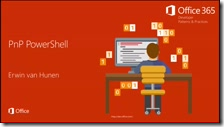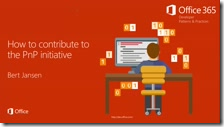Office Dev PnP Core Component–Training Package
We are happy to share a new set of videos in the Office 365 Developer Patterns and Practices Channel 9 video blog related on the PnP Core Component. Purpose of this training package is to provide more insights on the key capabilities in the PnP Core Component, which is available in the Nuget Gallery. PnP Core Component is additional abstraction layer on top of native SharePoint CSOM and REST interfaces and it simplifies development with managed code (.NET).
There is different versions of the PnP Core Component for SharePoint Online and for SharePoint 2013 on-premises. SharePoint 2016 version for on-premises will be released as part of the PnP monthly release on May 2016.
As part of this initial version of the training package, we are providing set of videos and presentations, which concentrates on different use cases of the PnP Core Component. We are also looking for creating hands-on lab materials for each of the modules, if there’s interest and demand for this material.
Here’s full list of modules included in this training package:
- Introduction to PnP Core Component
- Basic operations with PnP Core Component
- Remote Timer Job framework
- Authentication Manager
- Site Provisioning Framework
- PnP PowerShell for scripting with Core component
- How to contribute to PnP initiative
Instructors in the recorded videos
We have 6 different instructors for the videos. Here’s a short introduction for each of them.
Antons MislevicsSenior ConsultantEnterprise Services, Microsoft
|
|
Bert JansenService EngineerOffice 365, Microsoft |
|
Erwin van HunenProduct OwnerRencore |
|
Paolo PialorsiSenior ConsultantPiasys.com |
|
Patrick RodgersSenior Program ManagerOffice 365 CXP CAT, Microsoft
|
|
Vesa JuvonenSenior Program ManagerOffice 365 CXP CAT, Microsoft |
Module introduction
Here’s a short introduction to all modules and links to key resources. You can see more detailed descriptions for each video in the video descriptions at the Channel 9.
Module 1 – Introduction to PnP Core Component
This module concentrates on explaining what the PnP Core Component is all about and how it can be used. It also introduces all key use cases what the PnP Core Component provides.
- Video at Channel 9
- Presentation at docs.com
Module 2 – Basic operations with PnP Core Component
This video concentrates on demonstrating basic extensions properties in the PnP Core Component and how they can increase productivity of the developers.
- Video at Channel 9
- Presentation at docs.com
Module 3 – Remote Timer Job Framework in PnP Core Component
This video concentrates on showing how to take advantage of the Remote Timer Job Framework in the PnP Core component.
- Video at Channel 9
- Presentation at docs.com
Module 4 – Authentication Manager from PnP Core Component
Authentication Manager helps with the authentication options in SharePoint Online and in SharePoint on-premises. Authentication Manager helps for example on connecting to SharePoint sites using ADFS in on-premises or for example using Azure Active Directory based authentications.
- Video at Channel 9
- Presentation at docs.com
Module 5 – Site Provisioning Framework in PnP Core Component
This video concentrates on the Site Provisioning Framework which is part of the PnP Core Component. Site Provisioning Framework helps on using so called remote provisioning patterns with SharePoint Online and SharePoint on-premises.
- Video at Channel 9
- Presentation at docs.com
Module 6 – PnP PowerShell – Use Core Component from your scripts
PnP PowerShell Cmdlets helps on using Core Component from PowerShell scripts.
- Video at Channel 9
- Presentation at docs.com
Module 7 – How to contribute to the PnP initiative
This video shows in practice how to get started with PnP GitHub repositories and how to potentially contribute back to community driven PnP initiative.
- Video at Channel 9
- Presentation at docs.com
Office 365 Developer Patterns and Practices
 Techniques showed in this blog post are part of the Office 365 Developer Patterns and Practices (PnP) guidance, which contains guidance and reusable solutions for demonstrating different patterns and practices related on the development for Office 365 and SharePoint on-premises.
Techniques showed in this blog post are part of the Office 365 Developer Patterns and Practices (PnP) guidance, which contains guidance and reusable solutions for demonstrating different patterns and practices related on the development for Office 365 and SharePoint on-premises.
Check the details around PnP from dev.office.com at https://aka.ms/OfficeDevPnP. Please join us on sharing patterns and practices for the community for the benefit of the community. If you have any questions, comments or feedback related on this sample, blog post or anything on PnP, please use the Office 365 Developer Patterns and Practices Yammer group at https://aka.ms/OfficeDevPnPYammer.
“Sharing is caring”
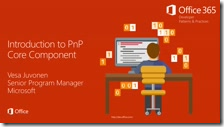
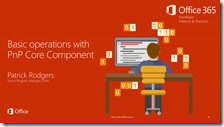
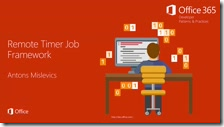
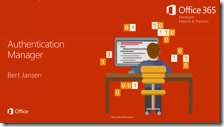
![image[15] image[15]](https://msdntnarchive.z22.web.core.windows.net/media/2016/04/image1511.png)
